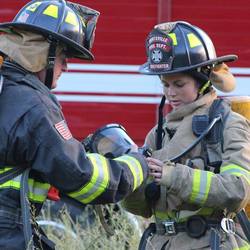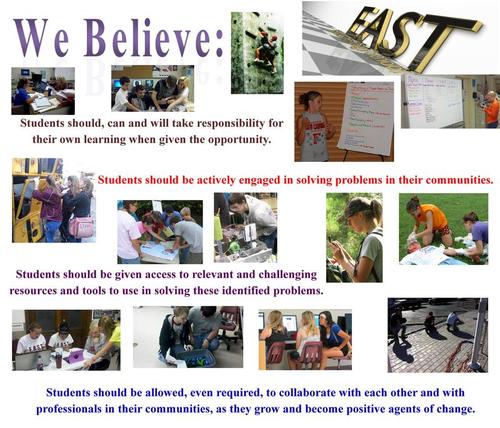Perspectives of Kevin C. Shinn
My Personal Philosophy 



It is my personal philosophy that life sucks. Bad things happen to good people every day. It is through our faith, family, friends, and the activities we choose to be a part of that we make life better. Some people struggle with their faith. We don't always have control over who our family is or what kind of people they are. Our friends are not always the best influence or able to meet our needs. But the activities we choose to be a part of and the attitudes we choose to hold are our own. They define us. They guide us. Today, I choose to make the world a better place to live in because it is what I choose to do.
Shinn Family Tradition on the Huntsville Fire Department
HUNTSVILLE, Ark. - It's a family tradition unlike most, multiple generations of one Northwest Arkansas family putting themselves in the line of fire.
"I've never known anything other than I was going to be a firefighter," said Asst. Chief Jeremy Shinn, Huntsville Fire Department.
To gear up and put your life on the line, is sometimes something that's just in your blood,
"It's just something our whole family has always done," said Lt. Kristyn Shinn Clark.
For the Shinn family, being raised around the Huntsville firefighters and hearing the roar of the fire trucks was a normal thing in their lives.
"I got to grow up with a different set of heroes," said Jeremy Shinn.
"The longest standing dream that I had is to be a firefighter since I was 4 years old, that's all I wanted to do," explained Shinn Clark. "That's just been the exception, you're a Shinn.. you're on the fire department."
"It is a source of pride to know that our people are here for all these decades serving our community, and doing the things necessary to not only take care of us but our own people," said Chief Kevin Shinn.
Right now, 5 different Shinns volunteer at the Huntsville Fire Department. There's been 11 Shinns total.
"We communicate probably on a little bit different level than just your other firefighters because we've known each other our entire lives," said Jeremy Shinn.
It's safe to say, fighting fires and saving lives is a family affair.
"Where going to a family function at Christmas is one thing. But when you show up to a fire and you have this other relationship outside of your family to connect to also, That adds a whole new perspective for you," said Jeremy Shinn.
Chief Shinn said what's been ingrained in him from his father and uncles, who have also served at the Huntsville Fire Department, is something he hopes to imprint on his family now.
"It's more about instilling the understanding that whether it's at the fire department or in some other form.. giving back to your community," said Chief Shinn.
As for the next generation of Shinns who may find themselves suiting up.
"I would love to fight fire alongside my son," said Jeremy Shinn.
"If they choose to be a part of the fire department, that'd be awesome. But as long as they're doing something to make our world a little bit better that's all I really care about," said Chief Shinn
Watch the KNWA interview by Haley Hughey at this link: A family tradition unlike most
The Future of Education and Our Nation
The future for the United States is in jeopardy for the first time in my adult life and the primary enemy is not Russia, China, Iran or North Korea. The main threat to our nation remaining the world’s superpower is our own people. The Technological Revolution is upon us and it is changing everything. We have the capacity to adapt but it is not at all clear that we have the will to make the changes necessary to remain the leader of the free world or to be the strongest economy in the world.
For most of our history, our Constitutional democracy combined with our vast natural resources, our location between two massive oceans and two weak neighbors and the flood of immigrants from around the world desperate for a better life willing to work hard mixed with our own industrious native people allowed the United States to prosper unimaginably.
But soon, as the Industrial Revolution gives way to the Technological Revolution, having a workforce willing and able to work hard and for long hours is simply not going to be enough to keep our country successful against our competitors.
Experts tell us that 70% of all low-skilled jobs and a quarter of all jobs will be replaced by automation within the next twenty years. That means that millions of people who currently have one of those jobs will be competing with graduates prepared for those jobs at a time when those jobs cease to exist. Then what?
We need to be rapidly transitioning our educational system to meet the reality of this looming challenge. That means adjusting our K-12 curriculum to reflect the growing role technology will be playing and the understanding that most of the jobs our graduates will have as a career have not been invented yet.
Right now, artificial intelligence and robots are equaling, and in some instances, besting humans when it comes to checking us out at Walmart, stocking our shelves, making our hamburgers, driving cars, playing strategy games, translating languages and even 3D printing homes. MIT is developing technology than can read our thoughts. AI is even beginning to learn by observation instead of just being programmed. It is easy to become overwhelmed when projecting the march of automation against our human workforce.
We are not flying blind into the upcoming upheaval facing American workers but for far too many of us, we are choosing to place blinders on preventing us from fully appreciating the challenges we will face. At the turn of the 20th Century, agriculture lost over 90% of its workforce to Industrialization. The world obviously did not end as humans adapted to new opportunities and created new jobs which led to even more jobs. But there was much agony and suffering for those caught in the grinding change.
What we will need to successfully make it through the revolution is a strong federal government with the strongest social safety net in our history, an adaptive education system that partners with business and other workforce partners as well as a ramped up adult education system designed to retrain those displaced by technology.
The transitioning period is likely to be difficult for millions of our citizens and how our nation comes out on the other side is totally dependent on if we start making the needed institutional and perceptual changes now before our Titanic economy strikes the technological iceberg that is coming.
Perceptions on Volunteerism
It is becoming increasingly difficult for volunteer fire departments to recruit members and to retain the ones they do for long periods of a time. In 1984, the National Fire Protection Association listed 897,750 volunteer firefighters in the United States which responded to a call volume of 11 million responses. But in 2007, that call volume has ballooned to 25 million while the number of firefighters had dropped to 825,450. (p. 48). This is an alarming trend when one examines the demographics of the United States.
According to the U.S. Census Bureau the United States has an estimated population of 308,585,287 people in our nation (U.S. Census Bureau, 2010). In the National Fire Protection Association’s (NFPA) Fire Service Statistics report released in November 2008, the NFPA stated (Appendix A) that there were roughly 1,148,800 firefighters in the U.S. in 2007. Of that number, 825,450 (72%) were categorized as volunteer firefighters while the remaining 323,350 (28%) were listed as career firefighters (NFPA, 2008.) According to the United States Census Bureau’s Population Estimates Program’s July 1, 2007 statistics there were an estimated 308,585,287 people in the nation (US Census Bureau, 2010.) The U.S. Fire Administration Firefighter Fatalities in the United States in 2007 Report (Appendix B) was released in June 2008. The report shows that on duty firefighter deaths included 68 volunteer firefighters and 50 career firefighters. Among the volunteer firefighter fatalities, 63 were from local or municipal volunteer fire departments, and 5 were part-time or full-time members of wildland fire agencies. Citing the NFPA’s statistics again, the majority of the career firefighters (74%) serve communities that protect 25,000 or more people; whereas, the majority of the volunteer firefighters (95%) protect communities of fewer than 25,000 people with more than half located in small, rural departments which protect fewer than 2,500 people. Finally, according to the US Census Bureau, 64% of our population lives outside of the nation’s urban centers.
People seem not to see that their opinion of the world is also a confession of their character. Ralph Waldo Emerson (1803 - 1882)

